Principal Sawan Singh Gogia
The Sikhs are generally blamed for collaborating with the British in the Indian Mutiny of 1857. Some enthusiastic patriots treat them as traitors and consider their non-cooperation the main cause of the failure of their so-called War of Independence. Perhaps they forget the ground realities, real situation of the Punjab and psychology of the Sikhs.
Was it a War of Independence?
Whether it was a War of Independence is also a controversial point. Some people have condemned it while others have applauded it. Many think that the main reason for the soldiers to revolt was religious. Wrapping paper of the newly introduced cartridges had to be bitten by teeth before it could be used. It was rumored that that paper was lubricated with the pig’s lard and cow’s fat. This rumor incited the aggrieved soldiers who were being ill-treated. Dr. R. C. Majumdar in his book ‘ History of the Freedom Movement’ writes on page xv11 : It was neither, ‘First’ nor a ‘ war of independence’. Sir J. N. Sarkar also does not treat it as a fight for freedom. In my opinion, the war raised by Banda Singh Bahadur was the first war of independence.
Role of the Army
At that time the East India Company had three different armies under its command: The Madras Army did not help the mutineers. Rather they were employed to suppress the mutineers at Kanpur. Only two battalions of the Bombay Army took part in the revolt. Thousands Marathas of the Bombay Army helped in suppressing the revolt. Only a small portion of the soldiers of the Bengal Army belonging to Brahmin and Rajput castes of U.P revolted.
An Ill-planned Effort
The Indian Mutiny was not a united and well-planned effort. Every party worked according to its own omens. There was lack of efficient and good leaders who could organize and guide the movement. There was no regular supply of funds, food and ammunition. There was no single political party and every group struggled independently without any joint effort. Pundit Nehru wrote in ‘Discovery of India’(page-279) that there was lack of nationalism.
Role of the Sikhs and the Punjab Army
After the Second Anglo Sikh War, the Sikhs in the Punjab had been rendered armless and leaderless. Their forts were destroyed. Patriot Sikh leaders were killed or deported. During the first year of the annexation of the Punjab, 8,000 Sikhs were arrested and 300 mutineers were put to death. New units of Army raised in the Punjab consisted of Sikhs, Muslim and Hindu Rajputs. The total number of Sikh troops was less than 6,000 including those working in the army kitchens. The Poorbias (soldiers belonging to east India) had fought against the Sikhs in both the Anglo- Sikh Wars and helped the British occupy the Punjab. The Sikhs could not be expected to help their enemies, the Poorbias, who spearheaded the Revolt. Part played by the Poorbia infantry against the Sikhs at Ajitwal, Buddo-wal, and Sabraon could not be forgotten. Their helpers, Lal Singh and Tej Singh, were the main cause of the defeat of the Sikhs. They cheated the Sikhs for their selfishness. Most of the important military centers in the Punjab like Phillaur, Kangra and Attock were with the Poorbia troops who also looked after the ammunition and arms. There was no unifying link between the Punjabis and the Poorbia forces; rather there was a lot of mutual distrust.
Role of the Princely States
The most substantial support to the British was rendered by the Phulkian states. Rulers of the states like Patiala, Nabha, Jind and Kapurthala supported the British not only with their troops, but also helped them in keeping the roads clear for the British troops and blocking the same for the mutineers. Without their help, the British could not send reinforcement from the Punjab to Delhi. As recorded in ‘ The Punjab, Past and Present, April 1974 ( page 158), Bahadur Shah whom the mutineers had placed on the Delhi throne wrote a letter to the ruler of the Patiala asking him to join him in the Indian Mutiny, but he ignored him and handed over the letter to the British. Same was the attitude of the rulers of the erstwhile Princely states of India. Ten thousands Gorkhas under Jang Bahadur assisted the British to suppress the revolt.
Rani (Queen) of Jhansi state and Nana Sahib
Rani of Jhansi and Nana Sahib are considered leaders of the Indian Mutiny, but they do not deserve this title as they joined the mutineers not due to their nationalist feelings, but only when the British refused to grant their selfish requests. Childless Rani of Jhansi had adopted a son and and after the death of her husband, Lord Dalhousie refused to recognize the adopted son, did not grant her pension and annexed her state against her pleading. Finding herself helpless, she joined the mutineers. As regards Nana Sahib, he was the adopted son of Peshwa Baji Rao who after his defeat in his fight against the British was exiled and granted pension. After the death of Baji Rao, Nana Sahib’s request for the grant of pension and other privileges was rejected by the British. He became disgusted and joined the mutineers for his personal reasons. Pt. J.L Nehru also agrees and writes in ‘ The Discovery of India’(page.282): Those who had joined the Revolt were, as a rule, the disinherited and those deprived of their power and privileges by the British, or those who feared that some such fate was in store for them.
Sikh Support to the Mutiny
It is a fact that the Sikh soldiers – especially those of the Punjab Irregular Force – fought for the British, but we cannot ignore the fact that the Army regiments of the Sikhs consisted of soldiers from different communities from different provinces. The Sikh soldiers who joined the mutineers being a few in numbers felt isolated as they had no native officer of their own in heir regiment and obeyed the English . Moreover, they had hostility for the Poorbias and fear of ruthless suppression attracted them to the British. Mazabi (low caste) Sikhs who got recruited remained loyal to the British as their social status was raised. Victory of the British at Delhi discouraged the Sikhs and many Sikhs joined the British army.
British Measures to Prevent Spreading Mutiny in the Punjab
As soon as the news of outbreak of the Indian Mutiny at Meerut reached Lahore on 12th May, 1857, the Chief Commissioners took strict measures to stop spreading it. The Punjab Press was also placed under strict censorship. All the armed Indian sepoys posted between the Indus and the Sutlej were disarmed. Censorship of the mail at all the post offices was started. Guards were posted at the ferries and the hill passes. Travellers were required to obtain passport. Civil population was also disarmed and doubtful persons were arrested. Saintly person like Bedi Bikram Singh was put under surveillance. Bloody dramas were enacted at several places where disloyal sepoys were executed. These bloody carnages and atrocities terrorized the population.
The Role played by the Sikhs
The Sikhs have been fighting for the independence of India. The Kuka Movement was, in fact, a rebellion against the British. Many Kukas were arrested and exiled. Some of them were blown off by guns. Their leader Baba Ram Singh was arrested and exiled to Burma where he died in jail. Since the loss of their kingdom under Maharaja Ranjit Singh, the Sikhs were dispossessed and browbeaten by a calculated official policy of intimidation and suppression adopted by the British. Disarmament of the people, and disbanding of the Khalsa amy were a part of this policy. Scores of Punjabis were put behind bars as they were suspected of disloyalty and many deserters were hanged. Maharaj Singh who was preaching against the British, was exiled and tortured to death. The Ghadar movement was started by patriotic Sikhs. The Akali Lehar and the Babar Akali movements against the British were started by patriot Sikhs who suffered a great loss during these movements. Numerous Sikhs were arrested, tortured, punished, exiled , hanged and their properties were confiscated during these movements. Figures show that sacrifices made by only 2% Sikhs for the independence of their motherland have been much more than those of the two major communities.
Conclusion
Those who point fingers at the Sikhs for not cooperating against the British during the Indian Mutiny close their eyes to the ground realities. Perhaps, they do not know that the Hindus of Bengal and Bihar refused to help the mutineers and whole-heartedly helped the British during the Mutiny. It is strange that patriotic activities of the Sikhs and their sacrifices and sufferings for the independence have been forgotten and they are being blamed for not taking part in the Mutiny which was the handiwork of those selfish people who wanted to save their thrones. The Sikhs played a very limited role as the circumstances were very peculiar and discouraging. It is wrong to say that the Sikhs collaborated with the British in the suppression of the Indian Mutiny of 1857 which was not an organized one. It was a primitive response to the British threat. (Updated: This article appeared here first on Nov 16, 2016)
(These are the personal views of the author)

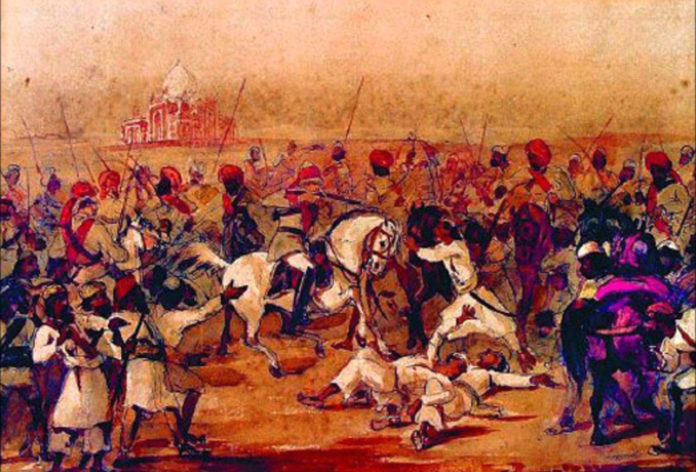
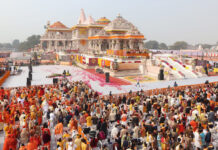
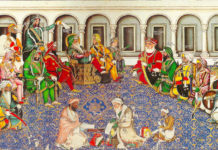
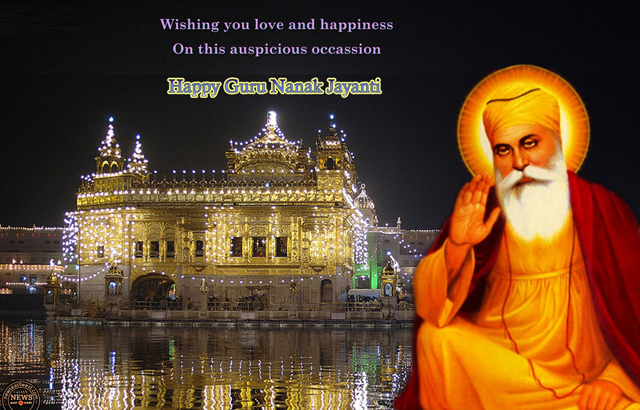
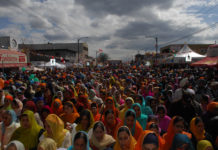



It is interesting that the Anglo-Gurkha War and the Anglo-Sikh Wars, gave the British East India Company an appreciation for the military prowess of Gurkha and Sikh soldiers and the company began to recruit them into British service. They slowly but surely started to replace the high caste Hindu troops whose religious sensibilities had begun to frustrate the British. One of the main causes of the Great Mutiny was this discontent amongst these high caste Hindu sepoys who were losing theur military career opportunities. The Muslim sepoys and freelance jihadis came into the mutiny a bit later. When mutinous sepoys, both Hindu and Muslim, sought the approbation of the Mughal ruler in Delhi for their revolt against the British, the last thing the Sikhs wanted was a resurgent Mughal empire. Therefore, siding with the British in putting down the mutiny was a strategic undertaking in self-preservation.